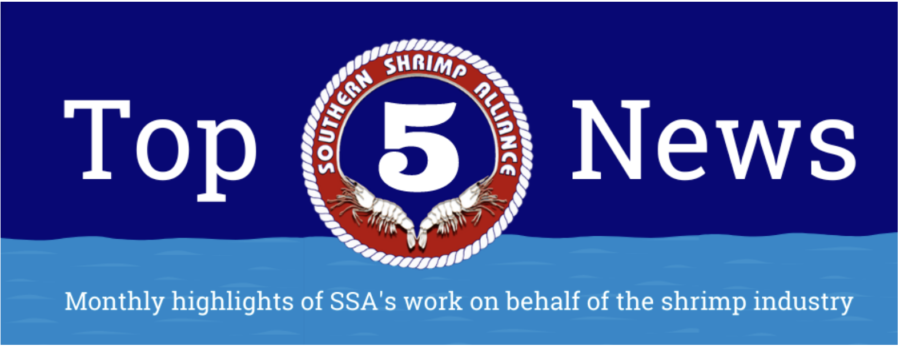

SSA Urges Commerce to Initiate Trade Action Against Unfair Shrimp Imports
On September 12th, SSA’s directors met with Department of Commerce officials to request that the agency self-initiate antidumping and countervailing duty investigations of unfairly traded shrimp. The vast majority of shrimp imports come from countries that Commerce previously found to engage in unfair trade.
SSA members have demonstrated that dumped and subsidized shrimp imports injure the U.S. shrimp industry. After meeting with SSA, Commerce and the International Trade Commission convened other meetings with shrimp industry members on September 25th and with local, municipal, and state government officials on September 28th.
Why This Matters
- Investigations of unfairly traded shrimp imports can result in additional duties on these imports.
- The effectiveness of antidumping duties currently imposed on shrimp imports has been significantly undermined by foreign governments providing impermissible subsidies.
- A decision by Commerce to initiate investigations is the fastest way for the domestic industry to obtain relief from unfairly-traded imports. Requiring the industry to file formal petitions for relief again is an unnecessary bureaucratic requirement, especially when the industry consists of thousands of small, family-run businesses united in supporting trade remedies.

Coastal Communities in Eight States Declare Disasters
SSA is seeking a fishery resource disaster determination for shrimp fisheries throughout the Southeast and Gulf of Mexico region. In August, SSA sent a letter to the Governors of all eight shrimping states asking that they collectively request the Secretary of Commerce make the disaster declaration.
Why This Matters
- Local disaster declarations emphasize the sector’s significance within each state. They also pressure state and federal officials to address the problems caused by unfairly traded shrimp imports.
- In an August letter to governors, SSA requested governors collectively seek a federal fishery disaster declaration and urged localities to rally behind the effort. Governor John Bel Edwards of Louisiana responded positively by contacting the Secretary of Commerce. SSA has not heard a response from other offices.
- A region-wide fishery resource disaster determination is the first step in allowing NOAA to provide financial relief to shrimpers through its Fishery Disaster Assistance program.
SSA Appeals Final Results of 17th Administrative Review of Indian Shrimp
The appeal with the U.S. Court of International Trade challenges the final results of Commerce’s 17th administrative review of antidumping duties on Indian shrimp. It marks the Ad Hoc Shrimp Trade Action Committee’s participation in its 99th federal court case to defend and strengthen antidumping duties.

Proposed Habitat for Rice's Whales May Impact Shrimping
NOAA proposes to designate critical habitat for the critically endangered Rice’s Whale in the Gulf of Mexico. On behalf of U.S. shrimpers that rely on access to traditional fishing grounds, SSA requested modifications to the proposed critical habitat boundaries.
Why This Matters
- The proposed critical habitat for Rice’s Whale overlaps with areas where brown and royal red shrimp are typically caught. Establishing a critical habitat could restrict access to these fishing grounds.
- SSA previously asked NOAA to analyze and map shrimp fishing effort data. In its comments, SSA uses this data to justify changes to the critical habitat area to accommodate the shrimp fisheries.

Proposed Changes to the Magnuson-Stevens Act Could Affect Shrimpers
NOAA Fisheries is considering changes to the Magnuson-Stevens Fishery Conservation and Management Act (MSA) to align with the Biden Administration’s priorities on climate change, environmental equity, and justice. In September, SSA submitted comments expressing strong reservations about potential revisions to the Act’s Guidelines for National Standards.
Why This Matters
- The National Standards and their associated Guidelines state the principles that all fishery management plans must adhere to. Any alterations to National Standards 4, 8, and 9 could have far-reaching consequences for all U.S. fisheries, including shrimp.
- National Standard 4: SSA believes Regional Fishery Management Councils already possess the authority to consider changes in a fishery’s stock distributions due to environmental shifts and to ensure equitable resource access. Rather than changing the Guidelines, perhaps Councils should simply adhere to them more closely. For instance, Congress dictates that each Regional Council maintain a “fair and balanced apportionment” of commercial and recreational fishing interests. Yet, the Gulf Council lacks representation from the shrimp industry. Achieving balanced representation would greatly promote fair access to the resource.
- National Standard 8: SSA maintains that the current definition of the fishing community defined in the MSA is sufficient. Eliminating location-based criteria and other suggested adjustments could lead to confusion and potentially costly legal disputes.
- National Standard 9: NOAA Fisheries proposes better accounting for shifting distributions of target stocks, bycatch, and protected resources. The existing Standard has effectively managed the distribution of red snapper stocks between the Gulf shrimp fishery and the commercial and recreational red snapper fishermen by incorporating red snapper bycatch mortality into the stock rebuilding plan.
SSA Supports Inclusion of Seafood Under USDA Programs

Senator Cassidy Introduces Bills to Address Indian Subsidies
U.S. Senator Bill Cassidy, M.D. (R-LA) introduced two bills designed to address the Government of India’s rampant subsidization of food products, including shrimp.
In the Prioritizing Offensive Agricultural Disputes and Enforcement Act (or the Ag Disputes Act), Senator Cassidy proposes the creation of a joint task force on agriculture trade enforcement that would recommend meaningful responses to the Indian government’s subsidy programs.
The India Shrimp Tariff Act would impose a general rate of duty on Indian shrimp of ten percent beginning in 2024. One year later, in 2025, the duty rate would be increased to twenty percent. From 2026 forward, the duty rate on Indian shrimp would be forty percent–equivalent to India’s own duty rate on shrimp imports. It would also eliminate the exemption of cooked shrimp from the requirements of the U.S. Department of Agriculture’s country-of-origin labeling (COOL) requirements, providing consumers the ability to choose U.S. wild-caught cooked shrimp at grocery stores throughout the country.
Why This Matters
- With this massive government support, India has flooded global markets and decimated food producers in the United States.
- The Government of India imposes a customs duty of thirty percent on shrimp imports with an additional ten percent social welfare surcharge on imports. At the same time, the United States imposes no basic duties on imports of shrimp into this country.
- Despite being heavily subsidized, Indian shrimp aquaculture is characterized by decimated mangrove forests, rampant use of banned antibiotics and fungicides, and child labor and forced labor.
